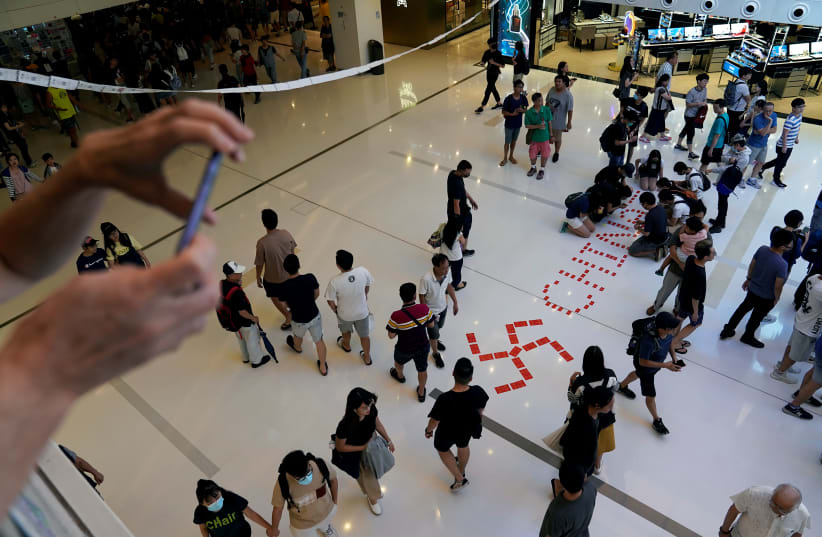The trend is best encapsulated in the phrase "Chinazi," a portmanteau of China and Nazi. There is even a hashtag: #ChiNAZI. However, it is also marked by increasing uses of Nazi imagery, including a distortion of the Chinese flag meant to resemble a swastika.And this has only grown with the movement over time, with many politicians and protest organizers utilizing the imagery themselves.Hong Kong looks like Nazi Germany, Today!#HumanRightsViolation #hongkong pic.twitter.com/I6HudDoz5m
— Seki Kwan (@SekiKwanjp) October 31, 2019
Ahead of one September protest, the organizers of a planned Global Anti-Totalitarianism March – redubbed the Global Anti-Chinazi March – published several graphics and explanations over Telegram to explain and justify the many comparisons made between Beijing and Nazi Germany, such as comparing China's internment camps in Xinjiang to Nazi concentration camps.Banner by People Power, the pro-democracy coalition chaired by lawmaker Ray Chan. pic.twitter.com/AXAL3NIkzV
— Mary Hui (@maryhui) September 15, 2019
While the backlash has seen some attempts at removing the Nazi imagery and the term Chinazi, it hasn't been complete.Notably, the Nazi comparisons are a two-way street in this case, as official Chinese state media has compared the protesters to Nazis on multiple occasions, often using the label "Blacknazi."History repeats itself#ChiNAZI pic.twitter.com/haHosaxLYS
— 로트리버 民主香港加油 (@Rotriever) November 14, 2019
The usage of Nazi labeling is very controversial, as some say it minimizes the horrors of Nazi Germany and the Holocaust. In addition, many Chinese people overseas also find it offensive and even racist. Last week, the Art Department at the University of Missouri-Kansas City removed pieces of pro-Hong Kong democracy-protest artwork due to the usage of Nazi imagery and the label of Chinazi, as reported by the Kansas City Star.Among the Jewish community, the reception is similarly mixed. According to an op-ed in the Hong Kong Free Press by Erica Lyons, chairwoman of the Jewish Historical Society of Hong Kong, "The current situation doesn’t carry enough of its own weight to justify their use, and doing so minimizes the actual crimes committed by Nazi Germany and the attempted genocide of the Jewish people."No one disputes, however, that the roots of this are decidedly not antisemitic. Indeed, Hong Kong has a long and rich Jewish history, and the Chinese and Japanese never treated the Jews markedly differently from anyone else.“In fact, Jews in Hong Kong... have never suffered from antisemitism at all,” Lyons said in an interview with the Jewish Chronicle.Despite the controversy, many protesters on the ground defend the use of the imagery with a simple explanation. Rather than disregarding the severity of the crimes of Nazi Germany, they argue that China's alleged totalitarianism is simply that bad – and if not, then it's well on its way to becoming that bad.“The atrocities committed by the [Chinese Communist Party] may be greater than you originally thought,” said a protest organizer identified only as Johnson, according to Quartz. “Making this term ‘Chinazi’ is to send a warning to the world: If we do not stop the CCP (Chinese Communist Party), the deaths and the tragedies will probably keep happening. The victims may not only be the Chinese people, the Hongkongers, the Taiwanese, but [one] may be you. The history of German Nazi may repeat itself.”BLACKNAZI IN HONG KONG pic.twitter.com/vNaTLhp7gy
— China News 中国新闻网 (@Echinanews) September 21, 2019
